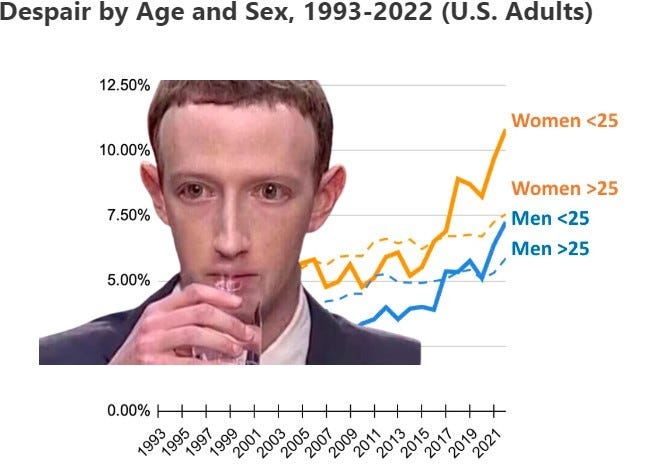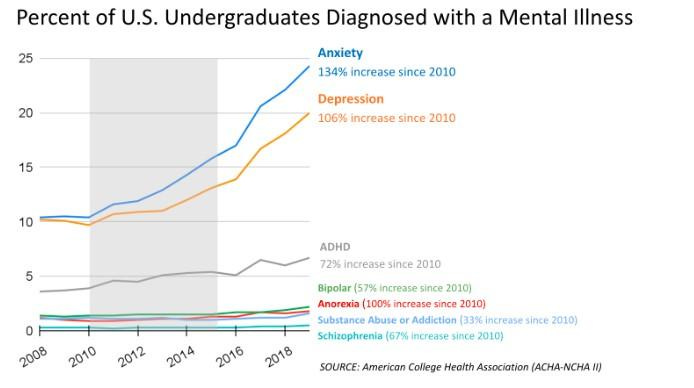The Gamification of Human Relationships
How Facebook, Instagram, and other social media platforms gamify human relationships to the tune of great profits. The results are not pretty.
Jonathan Haidt’s bestseller “The Anxious Generation” received some backlash. Most prolifically, social science researcher, Candice Odgers, published a review of the book in Nature where she claimed that there is no scientific evidence of a connection between excessive social media use and declining mental health among kids and teens.
However, the trendline is clear: despair and mental health disorders, have been rising steadily among young people since the early 2010s. The timing coincides with the proliferation of smartphones and social media. We can now speak of a “coming-of-age crisis” rather than a mid-life crisis since young people between 18-25 are the most depressed age group of all, for the first time in recorded history and consistently across 82 countries. Is this really because of smartphones and social media, or something else entirely?
Average US teens are spending nearly five hours a day on social media. The stats in Europe and other developed countries are likely not much different. Imagine spending five hours a day on a single activity as a youngster. With this level of dedication, it wouldn’t take many years to reach world-class level mastery in any field or endeavor. Unfortunately, social media is a greedy mistress that takes up a lot of time without giving much in return.
As Candice Odgers stipulates in her rebuttal to Haidt’s campaign, there are no simple answers to the youth’s mental health crisis. Furthermore, the interplay between social media and early brain development is hard to understand, measure, or quantify. We can even say it relates to the hard problem of consciousness, as people’s subjective experiences cannot be captured by engagement metrics.
I was thinking about that as I read this passage from a post by Freya India on Jonathan Haidt’s After Babel substack, Your Boyfriend Isn't Your Camera Man:
“There’s this popular phrase “Instagram vs Reality” that emerged in the early 2010s to capture the contrast between our appearances, relationships, and lifestyles, online and offline. I think it’s outdated now. For many young people, Instagram IS reality. At the very least we’ve all had times when we care more about capturing the perfect picture than living our lives.”
Why is it that other people's perceptions on social media, become more important than ordinary life, actual experiences, and relationships?
The paper How Twitter Gamifies Communication (2021) by philosophy professor at Utah University, C. Thi Nguyen, may provide an explanation: social media gamifies human relationships.
“Gameplaying involves the temporary adoption of an alternate set of goals. Why do all this? For one thing, our goals in game-life are so much clearer than in ordinary life. In ordinary life, our goals are often obscure. We often don’t know exactly what we’re doing — or we find our reasons hard to articulate and difficult to apply. And we are beset with a confusing welter of values – both from within our own value system, and from the bruising value complexity of the social world. But games offer a relief from all that. While playing a game, we know exactly what we are trying to do — and afterwards, we know exactly how well we have done. Success in a game is clear and unmistakable. There are points.”
Facebook, Instagram, and TikTok score our communication with points in the shape of likes and reposts. Like a slot machine, the system provides users with a kind of gambler’s high when the numbers go up, and sour feelings if they don’t. In addition, follower counts and friend lists are ranking systems that allow you to always gauge the popularity of your communications and your social standing compared to anyone else.
The social comparison game, combined with recommendation algorithms and clever design features such as push notifications and infinite scrolling feeds takes hold of the users’ time and attention. At the same time, Meta platforms like Facebook and Instagram, do not care about the quality of the content it shows to users or how it makes them feel. That is why horrifying AI-generated images are popular and go viral on Facebook. Jason Koebler on 404 Media calls Facebook the zombie internet, “where a mix of bots, humans, and accounts that were once humans but aren’t anymore interact to form a disastrous website where there is little social connection at all.”
Ed Zitron wrote a hard-hitting and accurate piece about how Facebook has demonstratively degraded over the last couple of years. Yet, users are not pulling the rug, because the platform is so addictive. Users are not customers but more like guinea pigs in a twisted social experiment that has made Meta one of the richest and most influential companies in the world. The engagement metric, how many minutes per day users spend on their platforms, weighs heavier than anything else, even in the face of internal research that shows how much Facebook and Instagram harm the mental well-being of kids and teens.
How Social Media Changes Our Offline Behaviour





